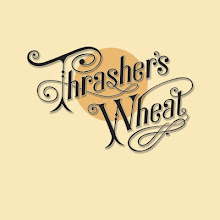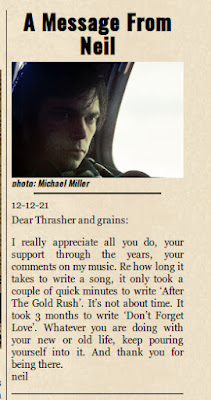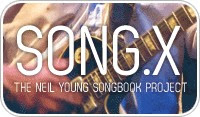Comment of the Moment: "Horse Back" and Audio Quality
The Comment of the Moment is concerning "Horse Back" and Audio Quality from the Steve Jobs and Neil Young thread by Kimball:
Now, on the subject of Horse Back Neil, wow, that is an assault of rich guitar tone. I can tell that even through the lossy compression of the video on Neil's website. Its going to be great to hear the record(s) when they come out.
Remember that little note on Neil's own news page on his website, that 2012 is going to be the year that the record companies bring high quality or high resolution audio to the masses. Seems like that was there back in August or so, and now Neil's speaking about the subject in public. I can't wait to see what the format is, and what it will require for equipment.
While I've been watching these videos of Neil speaking about digital sound quality, I've noted his lack of mention of the previously available forays into high rez that have been available in SACD and DVD-Audio (he even re-released several of his albums on DVD audio). He also has been spanking the 128 kbps MP3. He does not mention the availability of equipment that plays CD quality flac files, like the Cowon J3. I know he's got his sights on players that will support 24/192 files. I would love that support too. But perhaps he'll get more critical public mass momentum if he gets people to understand flac equipment that at least does CD quality, which is a great deal better than 128 MP3s.
(AIFF and WAV are lossless formats that maintain full CD quality, but are also uncompressed meaning they take up maximum space. FLAC is the same in that it is lossless, but it takes up less disk space. The same quality, but compressed. That is the difference between lossy and lossless compression. Its the compression that relates to how much space the material takes up. The lossy vs lossless relates to whether there is a loss of information. Think of a .ZIP file of a document. It takes up less space, but you can still expand it to get back to the original. That's lossless compression. Imagine if you wrote your life story and then saved it with LOSSY compression to be able to save it to fit on your thumb drive. You might lose every other letter or maybe you'd lose years of passages. With lossy compression the information is gone and it doesn't come back when you read out the material. Think of it in terms of your autobiography and you're approaching how Neil and other artists feel about their personal musical compositions going through the lossy shredder.)
Thanks Kimball! Great comment.
More on audio quality, Steve Jobs and Neil Young.
Labels: neil young, steve jobs































 Human Highway
Human Highway

















 Concert Review of the Moment
Concert Review of the Moment





 This Land is My Land
This Land is My Land

 FREEDOM In A New Year
FREEDOM In A New Year









 *Thanks Neil!*
*Thanks Neil!*




![[EFC Blue Ribbon - Free Speech Online]](http://www.thrasherswheat.org/gifs/free-speech.gif)











 The Unbearable Lightness of Being Neil Young
The Unbearable Lightness of Being Neil Young Pardon My Heart
Pardon My Heart



 "We're The Ones
"We're The Ones  Thanks for Supporting Thrasher's Wheat!
Thanks for Supporting Thrasher's Wheat!




 This blog
This blog 
 (... he didn't kill himself either...)
#AaronDidntKillHimself
(... he didn't kill himself either...)
#AaronDidntKillHimself









































































 Neil Young's Moon Songs
Neil Young's Moon Songs




 Civic Duty Is Not Terrorism
Civic Duty Is Not Terrorism Orwell (and Grandpa) Was Right
Orwell (and Grandpa) Was Right


 What's So Funny About
What's So Funny About 



9 Comments:
Not sure why most discussions about audio quality need to be so religious. The fact is that you can make very fine CDs (just take NY's CDs starting from mid-90s to today) as well as very crappy vinyl records (oh boy have I listened to crappy stuff in the 80's and early 90's).
The thing with CDs is that 16bit depth and 44KHz resolution is just fine for human ears. Sure you can create much higher-resolution audio, and it carries tons of more information, but it's effectively inaudible. That is a consequence of the inability of human ears to hear anything beyond 22KHz (heck, most people probably cannot hear beyond 16KHz already) and Nyquists laws.
Similar things can be stated about MP3s. At a high enough bitrate, they are indistinguishable from CD quality. Double-blind listening tests shows that beyond 192kbit/s MP3s basically are indistinguishable from CDs or MP3s of higher bitrate.
The problem as far as I can see is CDs that are not well done. There's so many ways that CDs can be screwed up. Digital is very unforgiving with regards to clipping. Go beyond the dynamic range of the CD (i.e. turn the mix up too loud) and you get very bad distortions since the signal will be clipped off (whereas in analog you'd 'only' distort the signal). Unfortunately this is a very common practice nowadays (loudness wars). One reason why SACDs sound much better is that the mastering process for SACD strongly discourages this cranking up to the max loudness. Another problem with digital lies in the mixing and mastering process. Each transformation of the original recording means loss of information. Mix 2 tracks together and you loose information. Adjust levels of a track and you loose information. Etc etc. That's why it's important to record, mix and master with high-res audio. That has not been done in the first decade(s) of CD audio and that's one of the reasons they sound bad.
On the other hand, analog recordings and vinyl have their own share of limitations that the guys in the studio need to have in mind. The resolution of magnet tape and vinyl is not infinite either. At some level you get crystals of stuff which ultimately define your possible resolution, and the depth of the groove and mechanics of the tonearm severely limit the dynamic range of vinyl records (that's why the RIAA curve has lower levels for the bass: when the bass gets too strong the needles would simply hop out of the groove). Also, the resolution of the signal depends on the running speed of the needle over the groove. You get higher quality on the outer end of the LP than on the inner tracks (and that is audible!). Well-made records only have stuff on the outer range for this reason. The best sound you get on EPs that only have one track on the outer end and run at 45rpm. Of course the same considerations apply with regards of the recording, mixing and mastering process: you need to use much higher-quality material during the process than you use for the end result because of all the inevitable loss in between.
Please stop being religious. Listen to the music not the technology. Give me any well done CD, vinyl or MP3 and I'll be happy! It doesn't get better only because I listen to it on the highest resolution format on the most expensive stereo ever. Music is good when it touches our hearts. And I remember how some music touched me very deeply even when I listened to it on the crappiest cassette player ever in my parents house.
Well said rkennke - you summed it up very well. Most of the "sins" are in the tracking/mixing/mastering process. Everything these days has to be compressed and limited to the digital distortion threashold.
Good music in any format is better than bad music in perfect audio. It's the music that matters; not the technology. Most of us don't have the many thousands of dollars worth of equipment or the sound proof booth to play any format at its optimum. Heck, some of us even listen to music in cars!
Andrew Kerr,
Sydney, Australia
This comment has been removed by the author.
This comment has been removed by the author.
All of this talk about inferior digital sound reproduction is lost on me. I am technologically challenged when the conversation turns into debates about what is and what should be. As the majority of the audiophiles from my era, I can recall being satisfied listening to AM radio play Jimi Hendrix on a 6-transistor radio under my pillow with an ear-bud for a speaker. I can recall hearing 'I Am The Walrus' and 'Strawberry Fields'on the same 'system' to my satisfaction because it was all I was exposed to at that time for my private listening experience. Then for Christmas I received a Panasonic 10 watt stereo with a pair of Koss headphones which was light years ahead of the little radio and opened the doors for a whole new listening experience for me, not to mention the addition of an 8-Track tape deck. The volume and dynamic range of those headphones were superb compared to anything I ever heard up until that point. Back in those day's in the detroit area we had three FM 'progressive rock stations' that had an 'album rock' free form format that introduced me to a whole new world of music and culture that I didn't know existed until then. That was in the late '68 - early '69 time frame when FM Radio was just in it's infancy. Even the commercials were hip! The D.J's would play whatever they desired and would follow up the songs with their own commentary of what was just presented to us. Hence, as many did, I became a member of various Tape-Clubs. Remember those? For one penny you could get ten selections if you agreed to buy ten more at the 'regular price' over the next year! The intent of my story here is to explain that until your ears were exposed to a higher quality system, you were generally content with what you were accustomed to. The same thing applied to car audio. I can remember what a thrill it was to have an ordinary factory AM-FM Radio with the addition of a rear speaker and a 'Reverb Unit'. It was so cool when you would hit a bump and rattle the 'delay spring' in the box and hear that thundering, crashing sound. I can still remember hearing 'Magical Mystery Tour' on my reverb and was totally blown away!. It wasn't until the early 70's that the Stereo boom started getting out of control in my area. Whoever had the receiver with the most watts and the tallest speakers was King, of course until another buddy would one-up ya with the next best thing. It seems that once your ears were exposed to a certain system, everything else prior to that was just plain inferior. I had waited until all of my buddies had purchased their systems before I bought mine as I wanted to have the state of the art unit. I did my research and decided on a Kenwood 9600 receiver with 200 watts oer channel ... two seperate amps rated at 200 watts each for a total of 400 watts! A Philips 312 Turntable, and most importantly a pair of Infinity Q-3 Speakers!. There I was in the listening room of the now defunct Tech Hi-Fi store and had the salesperson give me a test ride with my coveted system, Neil Young records in hand ... What better music to put it to the test! Everything was going as planned. I had never heard anything like it, It would certainly blow away anything my buddies had at the time and it would be a long time before they would be able to up-grade, since they had mortgaged their children to buy what they already had.
Then the sales person said "Have you heard the new Q-2's yet?" Before I had a chance to say no, he switched over to the Q-2's mid song during Cortez The Killer and the difference was stunning. After a couple mre 'back to back' demonstrations, needless to say, I had to drop another $500 for the Q-2's! Now, mind you, this was around 1977 and I ended up dropping close to $4000.00 on that system which was a considerable amount of money for then. But until that point, I had never heard a sound system that even came close to what was now all mine!.I wasted no time getting my new toy home to my apartment and set it up expecting multiple eargasms only to find out that my 1.5 amp rated speaker fuses were constantly blowing out at anything above half volume. After several fuses and much frustration I went back to the store where I purchased it only to find the salesperson less than enthusiastic to wait on me and referred me to the service dept. While waiting for what seemed like forever, I decided to go back into the 'listening room' to pilfer a couple fuses from the dissplay speakers out of spite only to find out that they had their fuses wrapped in tin foil to avoid the embarrassment of their fuses blowing while I had my demonstration! I still have that very stereo to this day and I have a demonstration that I do for anybody who cares to listen and be educated on the merits of 'analog v.s. Digital'. Numerous times I will play my captive audience a vinyl L.P. of their choice, usually Zuma or their chice, then at the same volume level I'll play the same recording, albeit on C.D. It NEVER fails that after hearing the warm, syrupy sounds of the L.P., it is actually painful to listen to the C.D. Comparable to scratching your dinner plate with a fork or something. That simple test, back to back, has never failed to get my point across that after so many years of technological advances, the Digital age has caused us to make leaps backwards in audio quality. In comparison, my ears actually long for the days of 8-Tracks, Cassettes, and that little 'reverb box' in my G.T.O. ( another story for another day) It's sad that we've compromised what the listening experience was meant to be in the name of convenience. Not surprising though, is that as the quality diminished, the cost has risen disproportionately to the pennies it cost the industry to manufacture a disk as opposed to pressing a vinyl LP not to mention the cost savings in packaging what I miss most of all, the album jacket with all of its wonders.
That "sounds" just about right to me Big Chief. Good story. Thnks.
Try comparing your snap, crackle and pop vinyl to blu-ray audio hooked into a nice Denon receiver with KEF speakers and tell me you still like that old, annoying technology. I never liked vinyl because with every play, it gets a little worse. There is always harmful dust everywhere, and you are constantly worrying about irreversibly damaging your collection in some way. There are plenty of great sounding CDs out there, by the way.
Post a Comment
<< Home